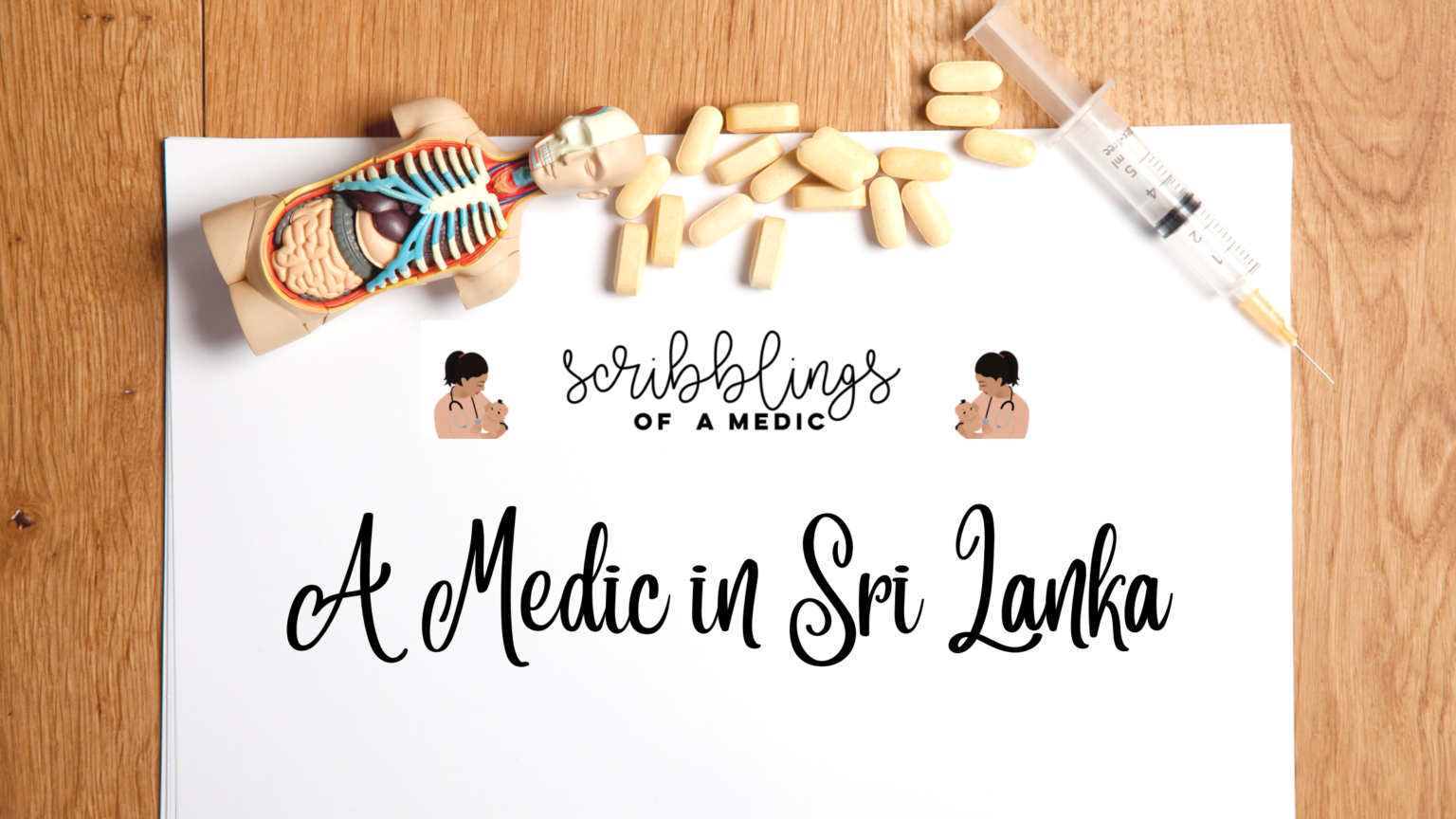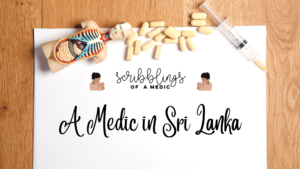Medicine differs from country to country and place to place all over the globe. The medical environment in Sri Lanka, for example, is drastically different from the UK, in terms of facilities and protocol. It is, therefore, no wonder that many medical schools insist that students partake in medical electives where they use 6-8 weeks of their summer vacation to intern in a different part of the world, experiencing a completely different culture and gaining new skills/experience.
My particular university programme scheduled for medical electives at the end of the 4th year – covering one location in 6 weeks or two locations for a total of 8 weeks. Choosing a medical elective was a little bit tricky – you need to think about the experience you want (i.e. developed vs developing country), the discipline (ideally one you hope to use in the future) and the cost involved over the 8 weeks.
The criteria of medical electives vary between universities and hence it is best to enquire with your university to find out exactly what is required and how to apply. Most universities have folders documenting prior experiences of students who go for their medical electives.
How did I apply for my elective?
After being briefed by my university at the end of my 3rd year on the objectives and assignment of the medical electives, I went about researching my options. I decided that I wanted to go to a developed country for my elective and settled between either Australia or New Zealand, primarily because I had never visited that part of the world before. A quick google search for medical electives in these two countries helped me find many universities/teaching hospitals in these countries that offered electives for medical students. Shifting through the disciplines available at the particular hospitals, I decided to apply for an elective in general surgery, breast surgery or cardiothoracic surgery. Some elective applications require payment and hence I narrowed my choices down to 5 hospitals (3 in Australia and 2 in New Zealand). I compiled my curriculum vitae (click on the link for more information on how to compile a CV) and then emailed it to all the hospitals during my 3rd year summer holidays (almost a year in advance).
Within 6-8 weeks I heard back from all the hospitals with offers. After weighing the pros and cons of each hospital (the cost, travel opportunities and the reputation of the hospital), I finally decided on an elective in Breast and General Surgery at Austin Health Hospital in Melbourne, Australia. A friend of mine from my batch also decided on the same hospital but in Cardiothoracic surgery and so I was thrilled to have a friend and travel buddy.

What was my experience like?
Daunting at the start. A completely new hospital setting with a different style of working. When I landed in Melbourne in June, it was the beginning of winter (completely mild compared to the UK). My friend and I met at our accommodation and every day would catch the bus to our hospital (about a 10-minute ride). I was assigned to a small team of breast and general surgeons at the Austin Health Hospital. This hospital also boasted the new Olivia Newton-John Cancer & Wellness Centre (funded by the Grease star herself during her battle with Breast Cancer).
Though small, the team carried out countless lumpectomies, wide local excisions and mastectomies. It was here that I got first-hand experience with sentinel lymph node biopsies. I would inject the blue radioactive dye into the surrounding areola lymphatics (careful not to get it on the floor or anywhere else because it does stain) and then massage it into the breast lymph drainage for about 60 seconds. Then during the operation, a radiosensitive probe would be used. The probe loudly screams when it encounters a lymph node containing the dye. The sentinel lymph node and about 2-5 other lymph nodes which tested positive for the dye (usually found in the 1st axillary group of lymph nodes)are removed and sent for histopathology. In addition to the breast cancer surgeries, I also got to witness and scrub in on the plastic surgery reconstruction flaps/implants. All very fascinating!
I took a little while to settle into my new team and understand all the different personalities of the team members. My week consisted of attending grand rounds, journal club meetings and attending the weekly multi-disciplinary meetings where many challenging cases were discussed between consultants of various specialities. During the weekly patient clinics, I got to consult patients on my own and then report to the registrar. I also got training in seroma draining and wound assessment. Most of my time was spent in theatre however and I got a bit of inbetween time to compile the research data.
I was lucky to get Fridays off, which meant almost every weekend I got to travel. I travelled around Melbourne, to the great ocean road, made a trip to Sydney and also went to New Zealand. I made sure I soaked up as much culture as possible since this was a rare opportunity! I was lucky to have my mother and my friend with me during this trip so I had travel buddies.
How to make the most of your elective?
1. Take advantage of all the benefits
On registration at the hospital in Australia, I was ecstatic to find out that I would have access to all the libraries and computer labs on the hospital premises (I’m an absolute nerd in case you didn’t know already!). This allowed me to study during my elective and gave me good access to revision material. I also got access to the medical student common room which meant I had a place to chill for lunch when I wanted to do some revision by myself or if I wanted to meet up with friends. There were also shuttle buses that I was allowed to use to move between the hospital compound for free.
2. Volunteer to do research
Any major university hospital will always be heavily invested in research. This doesn’t mean that you for sure will get your name on a research publication, but by taking part in research (even if it is just compiling the data and doing the statistics), you can definitely improve your research skills and learn from the best. I was lucky enough to compile data on research comparing nipple-sparing mastectomies and non-nipple sparing mastectomies. When I was doing my elective, there was much talk about nipple-sparing mastectomies, especially as it eases the taxing psychological impact that breast cancer surgeries have when it comes to reconstruction. It wasn’t easy compiling all that data, but I definitely learnt a lot during that time.
3. Become part of the team
Team get-togethers are very common in the medical system of the developed world and I was excited to join my team for dinners/coffees which helped with team bonding. During my time with the surgical team, these meetings helped me develop my confidence in voicing my opinion amongst the team members. This is an important learning experience for any medical student (especially because it is very rare for any medical student to feel like they belong in a team). Put your best face forward and make sure you use every opportunity to get involved with your fellow team members.
4. Make contacts
This is a funny story, but in the UK and Australia, everyone greets each other even if they have no clue who the person is. Randomly in the hospital lift one day at the midpoint of my elective, I met a doctor who turned out to be a consultant oncologist. He was very kind and invited me to sit in with him in his oncology clinic as he had no elective students. I jumped at the opportunity to get more experience and my surgery bosses were willing to give me away once a week for the rest of my elective. This meeting happened by chance, but I am very grateful that I got to learn more than what I set out to learn. It can be a daunting task to approach people you don’t know, but if you don’t ask and put yourself forward, you’ll miss out on so many opportunities.
5. Make sure you experience the culture outside medicine
Like I described above, I made sure to use this opportunity to also see the country. Australia is humongous, so I could only fully cover Sydney and Melbourne. There are so many sites to visit in Melbourne and as I got Fridays off, I got to visit many of them. (Picture below are snippets of my trip) I believe it’s not just important to experience the medical environment of the new country you travel to, but also the culture. So no matter where you choose to go, make sure you absorb some of the culture and traditions.
So in conclusion, I loved my 6-week surgical placement in Melbourne Australia and definitely learnt a lot. I highly recommend all students to try and gain some medical experience in a country that you’re not familiar with. It is a great learning curve and will definitely prepare you for the future. Make sure you don’t forget to also have some fun whilst you’re there!
Do comment below and let me know about your medical electives experience!











